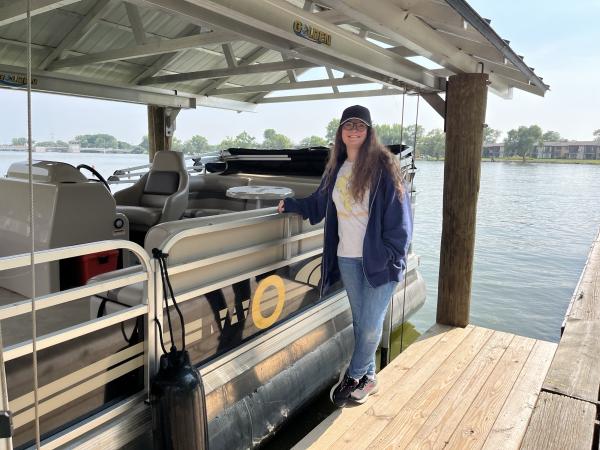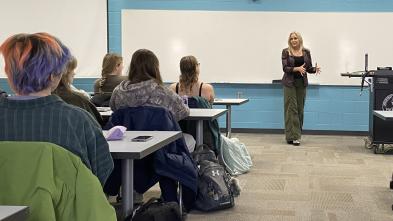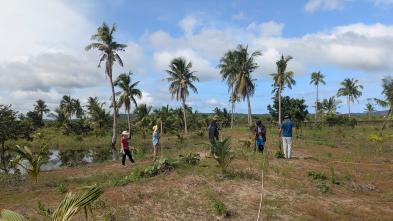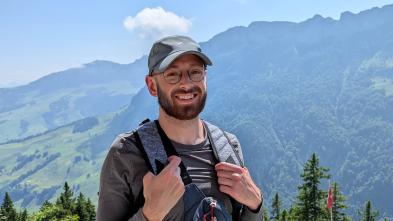“The summer after my freshman year, I took part in an internship program at the Environmental Research and Innovation Center at UW Oshkosh,” says the Edina, Minnesota, native.
A full-summer paid internship allowed Hafey to study the presence of microplastics and overall water quality in the Great Lakes — types of water studies simply not accessible in this part of the state.
“My internship was a meaningful way to network, learn hands-on biology and hydro field skills, and step into the world of research. The Great Lakes base gave me valuable preparation for a career in freshwater industry, conservation or research,” Hafey says.
Hafey’s high-impact internship program is supported by the Freshwater Collaborative of Wisconsin, a state initiative that combines the power of the state’s universities with partners from government, industry and local communities to solve freshwater issues and train the next generation of freshwater scientists.
Renewed commitment to freshwater science
On Sept. 17, the Freshwater Collaborative of Wisconsin announced its commitment to investing more than $4.2 million over the current biennium to support education and research in freshwater science, an investment that will bolster Wisconsin’s water workforce for years to come.
This significant funding is backed by the Wisconsin State Legislature and Gov. Tony Evers, and will support 19 freshwater projects involving students, faculty and staff from all 13 Universities of Wisconsin campuses. These projects will tackle Wisconsin’s groundwater challenges and support recruitment, hands-on curriculum, undergraduate research opportunities, career development and field training experiences for students interested in water-related careers.
In a statement from the collaborative, Universities of Wisconsin President Jay Rothman reiterated the mission of the initiative, saying that the combined efforts across the UW will “prepare future leaders while also strengthening Wisconsin’s economy, protecting our natural resources and serving communities and industries throughout our state.”
Direct impact on this campus
Since it was formed in 2019, the Freshwater Collaborative of Wisconsin has sponsored field study opportunities that include summer sessions at UW-Eau Claire. Dr. Sarah Vitale, associate professor of geology and environmental science, is the principal investigator and collaborator on Freshwater Collaborative of Wisconsin grant-supported research and training opportunities hosted by UW-Eau Claire.
“We are excited to see this renewed state commitment to freshwater science and education that this funding represents,” Vitale says. “We hope to continue growing student involvement in these programs at both the high school and university level."
UW-Eau Claire is receiving $104,405 of the biennium total to support the following programs:
- Water in Western Wisconsin: An Interdisciplinary Freshwater Field Camp for high school students, moving from UW-Eau Claire, to be hosted by UW-Stout in 2026.
- A three-week seminar course, the Freshwater Science Summer Field Experience in Western Wisconsin, hosted one week each by UW-Eau Claire, UW-River Falls and UW-Stout. See related story.
- A summer internship program, the Environmental Research and Innovation Center (ERIC) Laboratory Program at UW Oshkosh.
Vitale explains that the ERIC internship program is a nice representation of how the Freshwater Collaborative is meant to operate.
“It requires a kind of an all-hands-on-deck approach by all of us on the individual campuses to make students aware of these opportunities across the state,” Vitale says. “Oshkosh has multiple laboratory and field-testing sites in Door County and the through the eastern region of the state. Great Lakes research is very different from western Wisconsin water research, so it’s wonderful to give Blugold students unique opportunities elsewhere.”
Vitale says another exciting change to the three-week field seminar course is that students will now be able to use the course as a capstone.
“The field seminar is now officially listed in the UW-Eau Claire course catalog as a stand-alone course, upgraded from a special topics course, and it can now serve as a capstone course. The course is set up to be heavily project based to meet all the expectations of a capstone,” Vitale says.
Emphasis on student growth
As Rothman pointed out, the goal of the Freshwater Collaborative is to give Wisconsin students unique and robust experiences in the field of freshwater science, experience that Hafey credits with preparing her as a future professional.
“Working hands-on with water samples and learning techniques like microplastic filtration and sample analysis, I developed technical lab skills and a deeper understanding of our water systems,” Hafey says.
“Pairing that with experience in bacterial testing, lake monitoring and reporting data to agencies like the Wisconsin DNR, I learned how research directly supports public health and can impact environmental decision-making. It was a highly valuable internship.”




